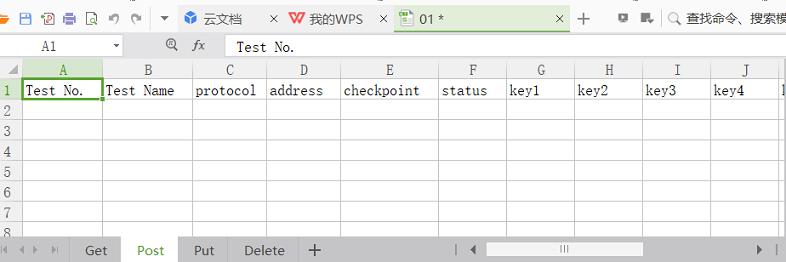接口自动化:HttpClient + TestNG + Java(五) - 接口测试数据驱动
在上一篇中,我们实现了post方法请求的封装和测试,这一篇我们做测试数据的分离。
5.1 测试数据处理思路
5.1.1 测试数据分离
这里我想到,我们之前的测试demo里,全都是在testNG类里去写入测试请求的相关数据。
如果测试到达一定规模,这样去维护测试数据会当然是不行的。
比较好的办法应该是将测试数据分离出来,通过外部文件来管理,然后读取文件驱动测试。
这个外部文件用Excel来做会比较合适,设计如下:

考虑用表单来驱动请求的方法,暂时写上了Get,Post,Put和Delete方法。当然其实我还没有去实现put和delete方法,后续再添加。
表单的内容分别记录:
- 测试用例编号
- 测试名称
- 协议
- 接口地址
- 检查点
- 状态码
- key1...keyN传入参数
之前用到的url这样的不会轻易变动的数据存放到另一个property文件中去。
5.1.2 配置数据分离
接下来将测试中所用到的配置独立出去:
在src/main/resource下新建config.properties文件。
Host = https://api.apishop.net/ testData = \\src\\test\\resources\\APIcase.xls
主要用于存放用到的外部文件位置。
5.2 数据读取和处理
5.2.1 测试基类读取配置
在项目中src/test/java下新建包com.test.api,创建类TestApi.java,写入以下内容:
package com.test.api; import java.io.FileInputStream; import java.util.Properties; public class TestAPI { public Properties prop; public String excelPath; public String host; //构造函数 public testAPI() { try {
//数据流的形式读取配置文件 prop = new Properties(); FileInputStream fis = new FileInputStream(System.getProperty("user.dir")+ "/src/main/resources/config.properties"); prop.load(fis); } catch (Exception e) { e.printStackTrace(); } host = prop.getProperty("Host"); excelPath=prop.getProperty("testData"); } }
把这个类做为我们测试基类,后续在创建测试时只要继承这个类就可以了。
5.2.2 POI读取外部Excel
在项目中src/main/java下的test.com.utils包中,新建ExcelProcess类,写入以下代码:
package com.test.utils; import java.io.File; import java.io.FileInputStream; import java.io.IOException; import org.apache.poi.hssf.usermodel.HSSFCell; import org.apache.poi.hssf.usermodel.HSSFSheet; import org.apache.poi.hssf.usermodel.HSSFWorkbook; import org.apache.poi.ss.usermodel.CellType; public class ExcelProcess {public static Object[][] proessExcel(String filePath,int sheetId) throws IOException{ //数据流读入excel File file = new File(System.getProperty("user.dir")+filePath); FileInputStream fis = new FileInputStream(file); HSSFWorkbook wb = new HSSFWorkbook(fis); //读取特定表单并计算行列数 HSSFSheet sheet = wb.getSheetAt(sheetId); int numberOfRow = sheet.getPhysicalNumberOfRows(); int numberOfCell = sheet.getRow(0).getLastCellNum(); //将表单数据处理存入dtt对象 Object[][] dttData = new Object[numberOfRow][numberOfCell]; for(int i=0;i<numberOfRow;i++){ if(null==sheet.getRow(i)||"".equals(sheet.getRow(i))){ continue; } for(int j=0;j<numberOfCell;j++) { if(null==sheet.getRow(i).getCell(j)||"".equals(sheet.getRow(i).getCell(j))){ continue; } HSSFCell cell = sheet.getRow(i).getCell(j); cell.setCellType(CellType.STRING); dttData[i][j] = cell.getStringCellValue(); } } return dttData; } }
5.2.3 jsonPath处理反馈信息
在本篇第一部分的设计中,我将每个测试的验证点写在了外部excel文件里,基本的想法是,从反馈信息内拿出相应的键值,与excel内的验证点相比较。
所以这里我需要改造之前的JSONParser,去实现特定键值对的获取。这里我用jsonPath去实现:
package com.test.utils; import com.alibaba.fastjson.JSONObject; import com.jayway.jsonpath.JsonPath; import com.jayway.jsonpath.ReadContext; import net.minidev.json.JSONArray; public class JSONParser { public boolean isResponseCorrect(JSONObject jo,String checkpoint,String passValue){
//用jsonpath处理json,获取result中特定键值 ReadContext context = JsonPath.parse(jo); JSONArray result = context.read("$.result.."+checkpoint); String resultString = result.get(0).toString(); if(resultString.equals(passValue)){ return true; }else{ return false; } } }
jsonpath本文不再赘述,感兴趣的可以去搜索一下相关教程。本段代码也只是简单的用".."去实现对result元素下的所有元素进行遍历和匹配。
5.3 实现测试类
5.3.1 TestNG类实现测试
重写TestPost测试类,改写后代码如下:
package com.test.api; import org.testng.annotations.Test; import com.alibaba.fastjson.JSONObject; import com.test.client.RestfulClient; import com.test.utils.ExcelProcess; import com.test.utils.JSONParser; import java.io.IOException; import java.util.ArrayList; import java.util.HashMap; import java.util.List; import org.apache.http.NameValuePair; import org.apache.http.client.ClientProtocolException; import org.apache.http.message.BasicNameValuePair; import org.testng.Assert; import org.testng.annotations.BeforeClass; public class TestPost extends TestAPI{ RestfulClient client; JSONObject responseBody; int responseCode; String url; String postBody; Object[][] excelData; HashMap<String, String> hashHead; @BeforeClass public void setup() throws ClientProtocolException, IOException { //读取用例excel excelData = ExcelProcess.proessExcel(excelPath, 1); //实例化client client = new RestfulClient(); //设置好请求头部 hashHead = new HashMap<String, String>(); hashHead.put("Content-Type", "application/x-www-form-urlencoded"); } @Test public void testPostRequest() throws ClientProtocolException, IOException { //从第二行开始遍历表单,跳过表头 for(int i=1;i<excelData.length;i++){ //从特定位置读取测试数据 String address = excelData[i][3].toString(); url = host+address; String checkPoint = excelData[i][4].toString(); String checkValue = excelData[i][5].toString(); //用NameValuePair存储所有请求参数 List<NameValuePair> keys = new ArrayList<NameValuePair>(); for(int j=7;j<excelData[i].length-2;j=j+2){ //因为每种请求的参数个数不确定,在这里进行非空判断 if(excelData[i][j]==null){ break; } NameValuePair pair = new BasicNameValuePair(excelData[i][j].toString(),excelData[i][j+1].toString()); keys.add(pair); } //发出请求 client.sendPost(url, keys, hashHead); responseBody = client.getBodyInJSON(); responseCode = client.getCodeInNumber(); JSONParser jParser = new JSONParser(); boolean result = jParser.isResponseCorrect(responseBody, checkPoint, checkValue); //断言判断结果 Assert.assertTrue(result); Assert.assertEquals(responseCode, 200); } } }
测试类继承前文的TestAPI类,setup方法读取excel表单,设置好请求头部,testPostRequest发送请求并分析结果。
5.3.2 测试结果
用以下外部测试数据驱动测试:

可以看到,测试用例中包含了两个不同的接口测试,测试均通过。
注:
在TestNG测试类里,在读取测试数据时,我采取的是读取固定位置的参数,显然这样的处理在代码健壮性上是比较差的,可以进一步改进。
另外测试数据中的protocol我只是进行了设计,还没有真正处理。
- 软件测试技术交流:【939885326 】
- 个人工作qq:【2049427226】
- 功能测试,自动化测试,性能测试,测试开发,测试架构,测试管理方面的问题欢迎与加群与我交流,加群时请备注下:博客园-Vincent



